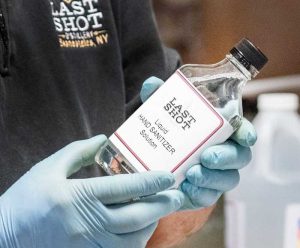A Syracuse Story by Brandon Dyer originally published on April 8, 2020.
According to the World Health Organization (WHO), alcohol-based hand sanitizers are effective against a broad spectrum of microbials and are the best option in places where hand washing and sinks aren’t readily accessible. Since the outbreak of COVID-19 in the U.S., hand sanitizers are nearly impossible to find in stores.
The scarcity of hand sanitizer was a concern for culinary specialist Chris Uyehara, so he investigated the problem to find out how he could help. In addition to teaching professional baking, fine pastry and introductory culinary classes at the David B. Falk College of Sport and Human Dynamics, Uyehara is also owner of the award-winning Last Shot Distillery in Skaneateles, New York. After investigating the logistics and a hand sanitizer recipe posted by the WHO, Uyehara reached a crossroads. “I had some product started. In fact, I had some ready to go, but I said, ‘You know what? I’m going to distill that to make hand sanitizer.’”
Last Shot Distillery has won several gold medals for American whiskey and lightening whiskey, but owner Chris Uyehara’s newest creation is not for consumption.
Uyehara soon reached out to some fellow distillers, and together they switched processes from whiskey production to sanitizers. Uyehara is doing all this while still conducting five distance learning classes, often grading papers late at night and into the morning. “It’s challenging, but there’s a need for the sanitizers right now,” he says. “We’re not even touching a small portion of what the needs are.”
“My target was to bring sanitizers to independent senior living facilities,” says Uyehara. Hand sanitizers are essentially ethanol with added glycerin or glycerol and hydrogen peroxide. Using a variation of his vodka recipe, Uyehara cooks corn sourced from Cayuga and Onondaga counties and triggers a fermenting process. “You take the alcohol out of that fermentation and distill it,” he says. The WHO recommends a minimum of 160 proof for sanitizers, which translates to 80% alcohol by volume. Last Shot Distillery—always an overachiever, with gold medals for American whiskey, corn whiskey moonshine and lightening whiskey—distills its hand sanitizer to 170 proof.

Last Shot Distillery charges WHO’s suggested wholesale amount for the bottles being sold. While this is enough to cover expenses, the company isn’t turning a profit on the new venture. That’s fine with Uyehara. “There’s a need. People are scared. They want sanitizers,” he says. Last week, he sold 500 bottles in two days. Since then, many local businesses have expressed interest. Last Shot has switched gears and is offering half-gallon containers to meet that demand.
With large and small businesses across the country switching gears to manufacture medical equipment, Uyehara is happy Last Shot can pitch in to help. “We may not be big like the big boys, but at least we can assist in our own community and do something good.”
